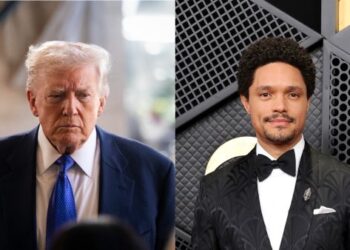Select Language:
Trump Downplays Musk’s Political Ambitions as Threat to Republicans
WASHINGTON: Despite U.S. President Donald Trump’s dismissal of Elon Musk’s newly announced political party as “absurd,” the tech tycoon’s move highlights a significant challenge for Republicans facing slim congressional margins. Musk, the CEO of Tesla, introduced the “America Party” this past weekend, following Trump’s signing of a comprehensive domestic policy bill, which Musk criticized for potentially increasing the national deficit.
While Musk hasn’t clarified his political platform, he is anticipated to focus on several congressional races in the upcoming midterm elections, particularly targeting Republican incumbents who supported Trump’s legislation after advocating for fiscal discipline.
“Elon Musk’s America Party represents an unpredictable factor that could disrupt the 2026 midterms, particularly for the GOP,” stated political analyst Matt Shoemaker, a former Republican candidate and ex-intelligence officer. “With such slim majorities in Congress, Republicans should be wary.”
Musk, recognized as the wealthiest person in the world, hinted at the party’s formation for weeks, conducting an informal poll on social media in June, which showed that 80% of over 5.6 million participants were in favor. This party would have access to nearly unlimited resources, backed by a substantial base of young American men who view Musk as a visionary and an icon.
“Musk’s influence resonates with frustrated independents and younger, tech-savvy voters who might typically lean Republican in competitive areas,” Shoemaker shared with AFP.
Lower Approval Ratings Than Trump
With an estimated fortune of $405 billion, Musk has already proven his willingness to invest heavily in political efforts, contributing $277 million to Trump’s 2024 campaign. However, his recent experience in Wisconsin—where he spent $20 million supporting a losing candidate in a state supreme court race—highlights the limitations of fame and wealth in the political arena.
Furthermore, he faces the challenging task of gaining support in the American Midwest from voters outside his Silicon Valley “tech bro” environment. Once celebrated by many Americans, Musk’s popularity has suffered since his involvement in the Trump administration as the president’s fiscal advisor. According to the latest ratings from respected pollster Nate Silver, Musk’s favorability is at -18.1, compared to Trump’s -6.6.
“While it’s essential to avoid generalizations, the Republican base and the MAGA movement are significantly intertwined today,” noted Flavio Hickel, a political science associate professor at Washington College in Maryland. “Their support for Trump has remained steadfast despite ongoing controversies. It’s difficult to envision a political venture linked to Musk successfully drawing votes from Trump supporters.”
Challenges for Third Parties in America
Although many individuals have transitioned to independent status, actual victories for third parties have been infrequent in recent U.S. history. The Conservative Party of New York in the 1970s and the Farmer-Labor Party in the 1930s are the only smaller parties to secure Senate seats in the last century. Smaller parties enjoyed more success in the House during the early 20th century but have clinched just one seat since the 1950s.
Several analysts have pointed out the multiple obstacles third-party candidates face when attempting to get on the ballot in a system favored by established parties. These hurdles encompass minimum signature thresholds, filing fees, and various state-specific regulations regarding age, residency, and citizenship.
“Recall the so-called ‘No Labels’ party that aimed to carve out a centrist path for the 2024 elections?” remarked veteran political strategist Matt Klink. “They ultimately fizzled out spectacularly.”
Experts agree that while winning congressional seats could be optimistic for Musk, he might still manage to undermine Trump by siphoning votes from susceptible Republican incumbents or financially supporting primary challengers to Trump-endorsed candidates.
“Musk’s party likely won’t secure seats, but it could cost Republicans significantly,” said Evan Nierman, founder and CEO of Red Banyan, a global crisis PR firm. “In competitive districts, even a small percentage of votes taken from the right could shift control.”







